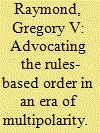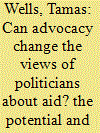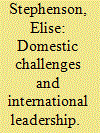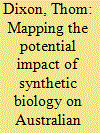|
|
|
Sort Order |
|
|
|
Items / Page
|
|
|
|
|
|
|
| Srl | Item |
| 1 |
ID:
165209


|
|
|
|
|
| Summary/Abstract |
Faced with eroding United States hegemony and the rise of a more multipolar distribution of global power, Australia has embraced a new foreign policy platform built around advocacy for a ‘rules-based global order’. In this essay I first argue that the emerging characterisation of multipolarity overemphasises the centrality of the United States and overlooks the legacies of Asian colonisation, decolonisation, state-building and local norm development. I then consider the reasons for the embrace of the rules-based global order construct, locating it as an instinctive reaction to issues arising from the South China Sea dispute, the raw use of power, and the inclination to share the ideas of a close ally. I note, however, that linking Australia closely with the United States approach to global rules has drawbacks, given the United States’ explicit attempts to reserve a right to use force outside the UN Charter. I suggest that Australia would be better served by clearly delineating a separation between its military alliance with a United States, a policy for worst-case scenarios, from its support for international law and institutions, which should form the mainstay and leading edge of its foreign policy.
|
|
|
|
|
|
|
|
|
|
|
|
|
|
|
|
| 2 |
ID:
165212


|
|
|
|
|
| Summary/Abstract |
Advocates of foreign aid in OECD countries navigate a unique form of politics. The beneficiaries of foreign aid spending have little voice in elite level decision-making about aid commitments from OECD countries. Thus foreign aid spending has a form of politics unlike other areas of policy where there is more direct budget accountability with citizens. Scholarly attention has increased on this unusual domestic politics of aid spending yet there remains little examination of the opportunities, challenges and tensions for aid organisations in advocating to elected officials. This article focuses on the case of Australian foreign aid, and the Australian Aid and Parliament project, an initiative of Save the Children. This initiative facilitates exposure visits to aid recipient countries for Australian parliamentarians. Most aid advocacy projects in OECD countries rely on mobilising citizens of those countries to act as a proxy, advocating on behalf of aid beneficiaries. This project reveals the potential of advocacy efforts that focus on the direct ‘presence’ of aid beneficiaries in the experience of elected officials (from donor countries). Yet it also reveals several challenges, and tensions between advocates, about how aid commitments change, and the most effective role for advocacy groups to play.
|
|
|
|
|
|
|
|
|
|
|
|
|
|
|
|
| 3 |
ID:
165211


|
|
|
|
|
| Summary/Abstract |
Women in international affairs play powerful and influential roles in shaping laws and policies, negotiating on subjects of war, peace and security, and representing national interest. In Australia, women outnumber men at all levels of public service to executive level one. Yet, women remain under-represented in more senior ranks and appear to experience significant challenges gaining leadership in agencies involved in diplomacy and security. What are the gendered institutions at play in Australian international affairs? Using a comparative case study approach, this paper explores the experiences of senior executive level women leaders across the Australian Federal Government in four case agencies—the Department of Foreign Affairs and Trade (DFAT), Defence, Department of Home Affairs (DHA), and the Australian Federal Police (AFP). Women’s gendered challenges in international leadership are not surprising within a diplomatic history that has often restricted women’s roles based off the ‘appropriateness’ of sending women as envoys to nations of varying safety and respect for their status. What is surprising is that women report greater sexism, discrimination and harassment from within their own agencies, not from countries in which they are hosted. This has important ramifications globally on gaining and retaining women in international affairs leadership.
|
|
|
|
|
|
|
|
|
|
|
|
|
|
|
|
| 4 |
ID:
165208


|
|
|
| 5 |
ID:
165210


|
|
|
| 6 |
ID:
165213


|
|
|
|
|
| Summary/Abstract |
Synthetic biology is an emerging technology that will impact on the future security and prosperity of Australia. As a discrete policy area synthetic biology has not been explored in relation to Australian foreign policy. To begin this process an understanding of Australia’s genetic endowment, Australia’s agricultural endowment and those security concerns novel to synthetic biology need to be developed. The convergence of the biological sciences and the information sciences is creating novel security concerns that impact on Australian sovereignty, both mainland and the Antarctic Territories, plant and animal health, and defence medical infrastructure. These concerns cross many traditional disciplinary and policy boundaries, an awareness of this is required and a nascent national practitioner community can develop this further. Drawing from work conducted by the US and UK synthetic biology practitioner communities, this article lays out the unique touch points synthetic biology has on Australian foreign policy.
|
|
|
|
|
|
|
|
|
|
|
|
|
|
|
|
| 7 |
ID:
165214


|
|
|
|
|
| Summary/Abstract |
Since the 1950s, US strategic architecture in the Indo-Pacific has been premised on its hubs-and-spokes model of bilateral alliances and security partnerships. Since the 2000s the US began working toward forging deeper interrelationships between its regional allies and partners. The emerging strategy ultimately aims to interlink long-standing allies like Japan and Australia, and also non-traditional partners in the development of a security network capable of maintaining the regional ‘rules-based order.’ In analysing the US-led triangular Indo-Pacific geometry, this article considers the prospects of an evolving and substantive US–Australia–Indonesia security trilateral. It does so by utilising Miller’s ‘conditions for cooperation framework’ to test the likelihood of greater cooperation between these three states. These conditions include cultural similarity, economic equality, habits of international association, the perception of common danger, and greater power pressure. It concludes that while there remain strict limitations on any formal alignment between the ANZUS partners and Indonesia, there are convergent interests in key sub-strategic areas in the maritime space and thus a viable path toward greater trilateral cooperation but not, as yet, formal arrangements.
|
|
|
|
|
|
|
|
|
|
|
|
|
|
|
|
|
|
|
|
|